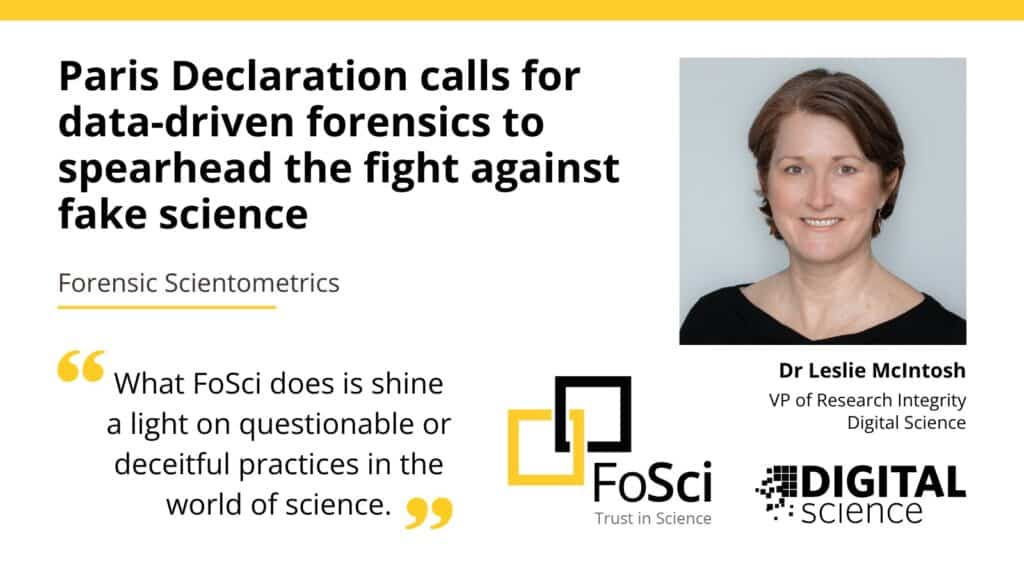Paris Declaration calls for data-driven forensics to spearhead the fight against fake science

Research integrity champions say Forensic Scientometrics (FoSci) will decontaminate “polluted” science and scholarly literature
Wednesday 18 December 2024
Supporters of research integrity have signed a new declaration calling for data-driven forensics – known as Forensic Scientometrics (FoSci) – to lead the charge in detecting, exposing and even preventing fake science.
The Forensic Scientometrics (FoSci) Paris Declaration was drafted during an event in Paris last week organized and run by Digital Science’s VP of Research Integrity, Dr Leslie McIntosh. The event was hosted at Institut Universitaire de France (IUF) by Dr Guillaume Cabanac, research integrity “sleuth” and professor at the University of Toulouse, as part of his research chair titled “Decontamination of the scientific literature.”
The event involved researchers, experts, and professionals from around the world who are committed to upholding research integrity, many well-known sleuths among them. Attendees signed the declaration over the following weekend.
As the Declaration states, “Trustworthy science risks being obscured by a small but growing corpus of papers, people, organizations, and potentially governments polluting the integrity of research.”
And: “We care deeply about science, and we believe firmly in the ability of scientific study to decontaminate the scholarly literature. As a collective, we intend to do whatever we can to promote the consistency and reliability of scientific research output.”
“We want to dispel this pollution by flagging problematic papers, actors, and systems, mitigating the effects and disincentivizing such behavior in the future. Our goals are to prevent these errors from spreading, to promote better policies for scientific endeavours, and to safeguard the positive impact of science on society.”
FoSci is a forensic, data-driven initiative to uphold scientific integrity and public trust in science. It combines forensic investigation and scientometrics, which is the study of how research is shared and built upon. FoSci uncovers patterns that uphold or threaten the integrity of science itself.
The problems currently researched by forensic scientometricians include: author misrepresentation, data manipulation, fake conferences, image duplication, misconduct (including fabrication, falsification, and plagiarism), papermill operations, questionable research practices, sale of authorship and citations, sneaked references, stealth corrections, and tortured phrases.
The Declaration states that these problems have widespread and potentially damaging implications, through the citation of fraudulent research in patents, clinical guidelines, government policy, and more.
Dr McIntosh, one of the co-founders of the FoSci movement, said: “Forensic scientometrics is needed now more than ever. Scientific achievement is critical to our society’s health and wellbeing, to our economic and social prosperity, but we also live in a time when the community’s trust in science is constantly being eroded.
“What FoSci does is shine a light on questionable or deceitful practices in the world of science. Through collective action, we want to motivate those involved in producing and disseminating scientific research to produce consistent, valid, and high-quality work.”
Dr Cabanac said: “Our gathering of institutions, journalists, publishers, sleuths, and a leading scientometric data provider proved highly stimulating and productive. Meeting in person created a synergy that we, as a community, plan to sustain and put at the service of science.
“Unreliable bricks weaken the wall of knowledge that researchers have been building for centuries, one publication at a time. Collective action is required, both curative to prevent humans and AIs from learning from these, and preventive to design methods to stop new forms of misleading contents from entering the scientific record. This declaration is a call for action: join us.”
The FoSci Paris Declaration has made the following key commitments:
- Advocate for transformation
- Open a dialogue with policymakers to design de-incentivizing strategies to tackle the mass production of problematic papers
- Advocate for reform of institutions involved in scientific research based on the group’s findings
- Develop expertise and share knowledge
- Facilitate training for researchers and professionals exploring these questions
- Share and provide research and data in the FoSci community
- Establish a regular cycle of professional meetings
- Improve the tools and methods of forensic scientometrics
- Improve the group’s ability to communicate its findings
- Inform editorial boards, publishers, research institutions, governments and all relevant involved parties about the group’s work
- Participate in building software and tools to enable the reproducibility of their forensics findings
- Establish points of contact between FoSci members and concerned organizations
The Paris event and its declaration are the culmination of a year of awareness-raising activities for Dr McIntosh, who has held workshops on FoSci in Athens, Los Angeles, Darwin and Sydney throughout 2024.
The signatories to the Paris Declaration hope that FoSci will become internationally recognized and taught at research institutions, particularly within research administration teams, but also among the academic community.
About Digital Science
Digital Science is an AI-focused technology company providing innovative solutions to complex challenges faced by researchers, universities, funders, industry and publishers. We work in partnership to advance global research for the benefit of society. Through our brands – Altmetric, Dimensions, Figshare, IFI CLAIMS Patent Services, metaphacts, OntoChem, Overleaf, ReadCube, Scismic, Symplectic, and Writefull – we believe when we solve problems together, we drive progress for all. Visit digital-science.com and follow Digital Science on Bluesky, on X or on LinkedIn.
Media contact
David Ellis, Press, PR & Social Manager, Digital Science: Mobile +61 447 783 023, d.ellis@digital-science.com



